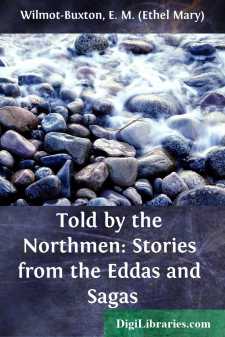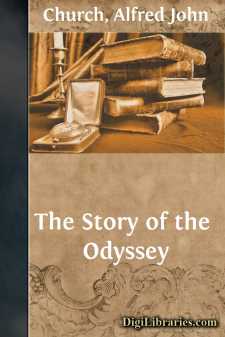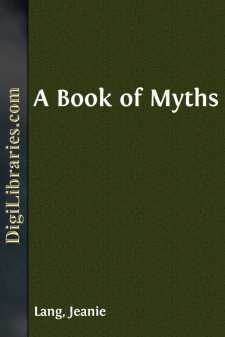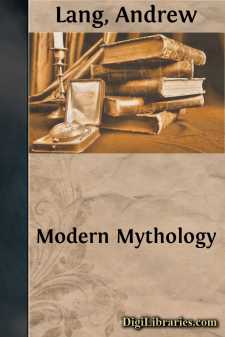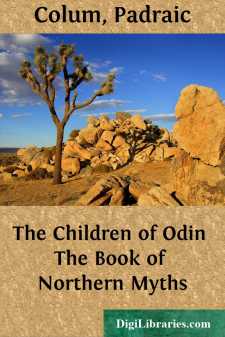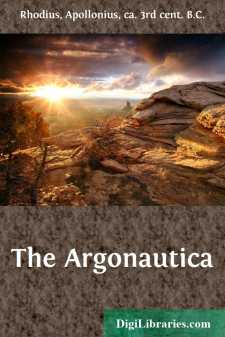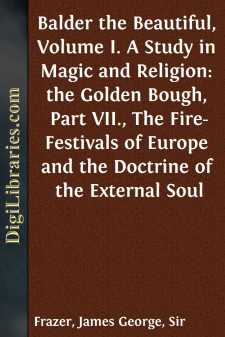Social Science
- Americana 1
- Anthropology 4
- Archaeology 7
- Criminology 2
- Emigration & Immigration 2
- Folklore & Mythology
- General 1
- Slavery 10
- Sociology 10
- Sociology of Religion 1
Folklore & Mythology Books
Sort by:
by:
Logan Marshall
PROMETHEUS, THE FRIEND OF MAN Many, many centuries ago there lived two brothers, Prometheus or Forethought, and Epimetheus or Afterthought. They were the sons of those Titans who had fought against Jupiter and been sent in chains to the great prison-house of the lower world, but for some reason had escaped punishment. Prometheus, however, did not care for idle life among the gods on Mount Olympus....
more...
Hakon's Lay By James Russell Lowell"O Skald, sing now an olden song,Such as our fathers heard who led great lives;And, as the bravest on a shield is borneAlong the waving host that shouts him king,So rode their thrones upon the thronging seas!"Then the old man arose: white-haired he stood,White-bearded, and with eyes that looked afarFrom their still region of perpetual snow,Over the little...
more...
INTRODUCTION Three thousand years ago the world was still young. The western continent was a huge wilderness, and the greater part of Europe was inhabited by savage and wandering tribes. Only a few nations at the eastern end of the Mediterranean and in the neighbouring parts of Asia had learned to dwell in cities, to use a written language, to make laws for themselves, and to live in a more orderly...
more...
by:
Jeanie Lang
PREFACE Just as a little child holds out its hands to catch the sunbeams, to feel and to grasp what, so its eyes tell it, is actually there, so, down through the ages, men have stretched out their hands in eager endeavour to know their God. And because only through the human was the divine knowable, the old peoples of the earth made gods of their heroes and not unfrequently endowed these gods with as...
more...
by:
Andrew Lang
INTRODUCTION It may well be doubted whether works of controversy serve any useful purpose. ‘On an opponent,’ as Mr. Matthew Arnold said, ‘one never does make any impression,’ though one may hope that controversy sometimes illuminates a topic in the eyes of impartial readers. The pages which follow cannot but seem wandering and desultory, for they are a reply to a book, Mr. Max Müller’s...
more...
by:
Padraic Colum
FAR AWAY AND LONG AGO Once there was another Sun and another Moon; a different Sun and a different Moon from the ones we see now. Sol was the name of that Sun and Mani was the name of that Moon. But always behind Sol and Mani wolves went, a wolf behind each. The wolves caught on them at last and they devoured Sol and Mani. And then the world was in darkness and cold. In those times the Gods lived, Odin...
more...
by:
Thomas Bulfinch
If no other knowledge deserves to be called useful but that which helps to enlarge our possessions or to raise our station in society, then Mythology has no claim to the appellation. But if that which tends to make us happier and better can be called useful, then we claim that epithet for our subject. For Mythology is the handmaid of literature; and literature is one of the best allies of virtue and...
more...
INTRODUCTION Much has been written about the chronology of Alexandrian literature and the famous Library, founded by Ptolemy Soter, but the dates of the chief writers are still matters of conjecture. The birth of Apollonius Rhodius is placed by scholars at various times between 296 and 260 B.C., while the year of his death is equally uncertain. In fact, we have very little information on the subject....
more...
CERBERUS, THE DOG OF HADES Hermes, the guide of the dead, brings to Pluto's kingdom their psyches, "that gibber like bats, as they fare down the dank ways, past the streams of Okeanos, past the gates of the sun and the land of dreams, to the meadow of asphodel in the dark realm of Hades, where dwell the souls, the phantoms of men outworn." So begins the twenty-fourth book of the Odyssey....
more...
CHAPTER I BETWEEN HEAVEN AND EARTH § 1. Not to touch the Earth [The priest of Aricia and the Golden Bough] We have travelled far since we turned our backs on Nemi and set forth in quest of the secret of the Golden Bough. With the present volume we enter on the last stage of our long journey. The reader who has had the patience to follow the enquiry thus far may remember that at the outset two...
more...



